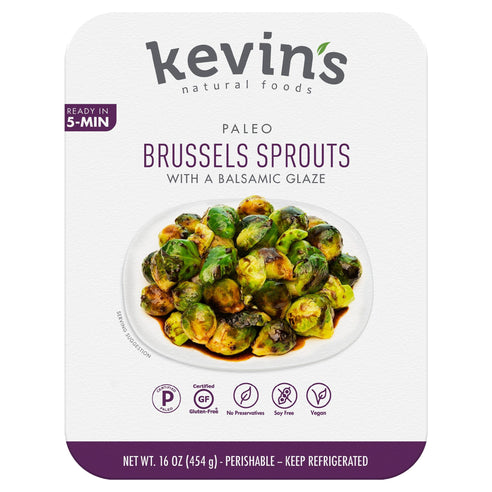The Vegetarian Keto Diet

Can you go keto without meat?
Vegetarianism and the keto diet are independently very popular eating styles. Both are commonly used for weight loss but are restrictive in different ways.
Beginning with what is keto diet, the keto diet is a low-carb diet, limiting your carb intake to near-zero. The vegetarian diet, of course, prohibits all meat, but it typically allows plenty of carbohydrates from starchy vegetables and grains.
People may adopt a vegetarian diet for a variety of reasons: an ethical objection to the meat industry, a desire to eat nutrient-dense foods, cultural practice, etc.
Keto dieters commonly switch to the diet to lose weight, but as we've discussed in the previous blogs, there are many reasons one might switch to eating keto: blood sugar control, epileptic seizure mitigation, increased energy, etc.
It's plain to see that while these diets are distinct, there is possible overlap, and one may find themselves wanting to eat keto, but do so without eating meat.
Check out this our vegetarian-friendly Brussel sprouts with a Balsamic glaze:

Tender chicken breast strips paired with a vibrant Piccata sauce made with garlic, capers, and a hint of lemon.
Brussels Sprouts
Can vegetarians get into ketosis?
Yes. These diets are not mutually exclusive and, with proper planning, you can build a high-fat low-carb diet that keeps you in ketosis without eating meat, seafood, or poultry.

The main idea is to include protein-packed veggies and pair them with high-quality fats. If you can get the proportions correct, you can eat a delicious vegetarian keto diet.
Principles of vegetarian keto
To set the stage for our keto vegetarian diet, let's cover the essential rules that our plan will have to abide by.
The standard ketogenic diet uses these macros for daily calories: 70% fats, 25% protein, >5% carbs.
But a lot of those fat calories often come from the meat. For instance, a fatty cut of beef gives you not only protein but plenty of fats as well.
This can make it more difficult to eat a vegetarian keto diet, replacing not only the protein but part of the healthy fats with plant-based alternatives.
No grains
While other vegetarian diets can compensate with whole grains, quinoa, and pulses, the vegetarian keto diet doesn't have this luxury. There will be no rice bowls on this diet (unless, of course, you mean cauliflower rice!)
Gimme protein, hold the carbs
If you're trying to eat a healthy vegetarian keto diet, it's important that you prioritize protein in your vegetable choices without choosing veggies with a high carb count.
For instance: potatoes are packed with nutrients, but have far too many carbs to be included in a ketogenic diet.
Spinach, on the other hand, has only 1g of carbs per 100g serving but is absolutely packed with protein.
Consider these other low-carb veggies:
- Broccoli
- Mushrooms
- Kale
- Cauliflower
- Zucchini
- Bell Peppers
Protein alternatives
Additionally, tofu and tempeh may play an important role in your vegetarian keto diet. Make sure you aren't buying a variety high in carbs.
The versatility of these products is the real winner. You can fry, grill, and stew them, controlling their flavor with spices and other ingredients.
An eggcellent exception

There are different degrees of vegetarianism. If you, like the majority of American vegetarians, can still consume dairy and eggs, you're in luck.
Eggs are a wonderful source of protein and healthy fats, as an addition to other meals or as a standalone snack!
Hard-boil a batch and keep them in the fridge for a quick and protein-packed munch.
Starch-less veggies
The hardest thing about a healthy vegetarian keto diet is the restriction of popular veggies that simply contain too many carbs to be eaten.
Here's a list of vegetables that should be avoided if you want to eat a keto diet:
- Yams (or sweet potatoes)
- Beets
- Carrots
- Parsnips
Legumes, too
These popular legumes should be avoided as well:
- Beans
- Peas
- Lentils
- Chickpeas
Healthy fats O' healthy fats
If you've been reading up on the keto diet, you know that nutrient-dense healthy fats are a critical element in any successful meal plan.
Remember - a healthy diet doesn't have to be a low-fat diet.
It's no different for the vegetarian keto diet, and the lack of meat or seafood increases the need for fats to substitute for the naturally occurring varieties found in animal products.

Here are some suggestions of vegetarian fat sources that could play an important role in your diet:
- Olive oil
- Coconut oil
- Avocado oil
- MCT oil
Cook with these oils, or use them to top salads and dishes, adding tons of great fats and nutrients to your meals.
Top keto vegetarian diet foods
Now that we've covered some essential facets of a healthy vegetarian keto diet, let's cover some of the best foods to incorporate into your meal plan.
You need to avoid nutritional deficiencies on this diet, a pitfall of traditional keto diets that vegetarian options are even more exposed to. These foods will help you get the vitamins and minerals you need without breaking ketosis.
Dairy dreams
Certain nutrient-dense dairy products are great tools for a vegetarian keto diet.
Greek yogurt
The full-fat, non-sugared varieties of Greek yogurt are great basis for a keto diet breakfast, providing protein and good fats.
Hard cheeses
Cheese is famously a key component of ketogenic diets. To keep it low-carb, opt for the harder cheeses (though some soft cheeses, like brie, are acceptable). Great as a snack or included with a meal.
Nut butter
While the traditional keto diet has plenty of protein, vegetarian keto needs a boost in this department. Butter from peanuts or almonds is a great option, packed with protein. Just make sure you get a low-carb variety!
Brussels sprouts
Another staple in keto diets, brussels sprouts are full of nutrients and very low in carbs, and they can be prepared many different ways!
Are bananas keto?
Unfortunately, no. Bananas, along with most fruits, contain too many carbs to be used in your vegetarian keto diet.
Here's a (non-exhaustive) list of the fruits that can't be eaten:
- Apples
- Oranges
- Pears
Some berries (like blueberries; raspberries, blackberries, and strawberries are ok in moderation)
Lemons and limes are relatively low in carbs, so they can be eaten on a ketogenic diet.
Why am I gaining weight as a vegetarian?
Ketogenic diet plans can be powerful tools for weight loss. So can vegetarianism. So why, you ask, might you be gaining weight on a vegetarian diet?
The truth is that weight loss works on a simple mechanism: a calorie deficit. If you're eating more calories than you burn, you'll gain weight.
A common mistake in vegetarian diets is that, without meat, cravings are satisfied by large helpings of carbs! Eating a lot of bread, pasta, or rice, no matter how many veggies you pair it with, will lead to weight gain.
Our Cauli and Cheese is the vegetarian delight you need, check it out:
Tender chicken breast strips and sous-vide vegetables paired with a soy-free teriyaki sauce made with coconut aminos, ginger, and garlic.
Cauli & Cheese
Is a vegan keto diet possible?
Celebrated for its health benefits, the vegan diet is even more restrictive than vegetarian diets, completely eliminating animal products.
The good news is, yes, a vegan ketogenic diet is possible, it's just more difficult. Without the help from dairy and eggs, getting enough protein and vitamins and minerals will pose a challenge. You might consider adding an organic nutritional supplement to your daily routine to compensate for this.
Conclusion
In this blog, we've established that vegetarian (and even vegan) keto diets are possible, they just require a bit of extra work compared to non-vegetarian keto. For delicious keto recipes, head over to Kevin's recipes page. It's never been easier to eat well.













